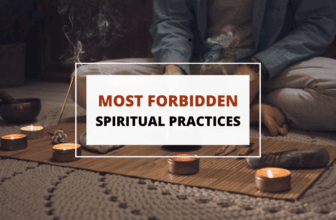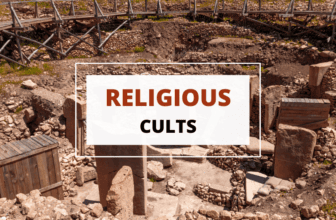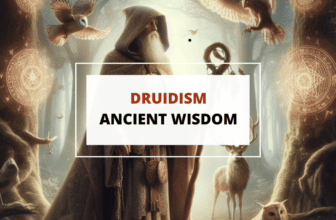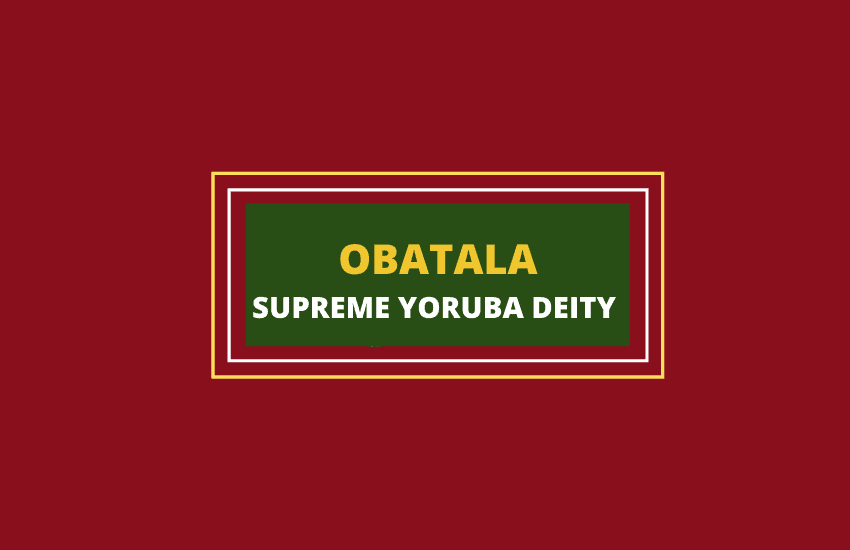
Table of Contents
One of the particularities of the West African Yoruba religion is that its supreme god, Oludumare, remains always far in the skies and governs the Earth through a group of deities known as the orishas. Among these deities, Obatala stands out for being the god of purity, clear judgment, and the creator of humanity.
For his closeness to Oludumare and his rectitude, Obatala is usually referred to as Alabalase (‘He who has divine authority’). He is the Sky Father and the father of all orishas.
Who is Obatala?
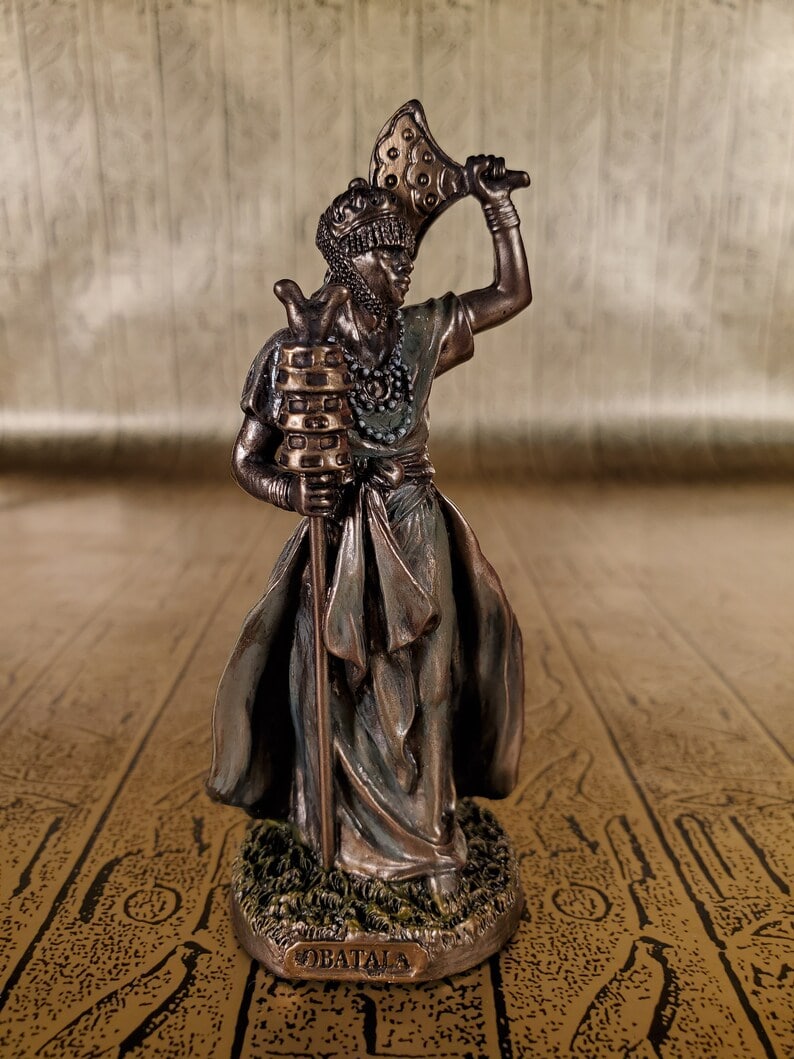
In the Yoruba religion, Obatala is a primordial deity, strongly associated with the notions of spiritual purity, wisdom, and ethics. According to myth, he was one of the 16 or 17 first divine spirits that Oludumare sent down to the Earth from the sky, to prepare the world for humans.
Divinities from the Yoruba pantheon were usually married to more than one deity at the same time, and this is also true for Obatala. Yemoja, or Yemaya, is Obatala’s principal wife.
Obatala is also worshipped in some of the Caribbean and South American religions that derived from the Yoruba faith. The god is known as Obatalá in Afro-Cuban Santería, and as Oxalá in Brazilian Candomblé.
Obatala’s Role
Characterized by his clear judgment, Obatala is often the divine authority consulted by the other orishas whenever they need to settle a conflict. Many orishas helped to build the world, but it was Obatala’s responsibility to give form to the Earth. Obatala was also assigned by Oludumare with the task of creating humans.
In some versions of the myth, in his human personification, Obatala was one the first kings of Ile-Ife, the city where the Yoruba people believed all life originated.
However, in other versions of the story, he tried to dethrone Oduduwa, the very first king of the legendary city, in an attempt to regain full control over humanity, but failed. The explanations for the power struggle that existed between Obatala and Oduduwa vary from one myth to another. We’ll come back to these mythical stories later.
Myths About Obatala
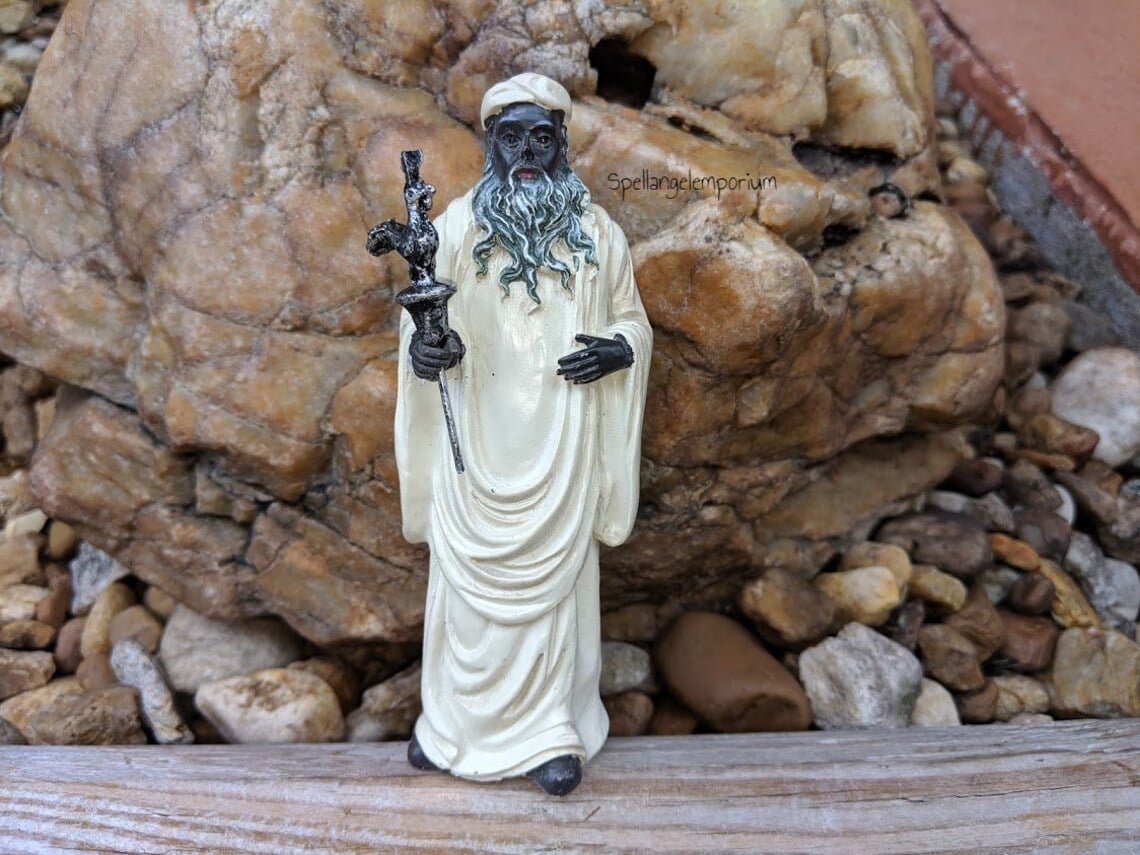
Yoruba myths featuring Obatala show him as a wise god, sometimes fallible but always reflective enough to admit his mistakes and learn from them.
Obatala in the Yoruba Myth of Creation
According to the Yoruba account of creation, in the beginning there was only water in the world, so Oludumare assigned Obatala with the task of creating earth.
Enthusiastic about his mission, Obatala took with him a hen and a snail shell (or a calabash) filled with a mixture of sand and some seeds, and immediately descended from the sky on a silver chain. Once the god was hanging right beneath the primordial waters, he poured down the contents of the snail shell, thus creating the first landmass.
However, all the land was concentrated in just one place. Knowing this wouldn’t do, Obatala proceeded to free his hen, so the animal would spread earth all around the world. Then, when the Earth was almost done, Obatala came back to Oludumare to report his progress. Happy with the success of his creation, the supreme god ordered Obatala to create humanity.
According to one version of the myth, here is when the other orishas started to feel envious, for Obatala was becoming Olodumare’s favorite. As a result of this, one god, reportedly Eshu the ‘trickster’, left a bottle filled with palm wine near where Obatala was molding the first humans with clay.
Shortly after that, Obatala found the bottle and started drinking. Absorbed with his task, he didn’t realize how much he was drinking, and eventually got very drunk. The god then felt very tired but didn’t stop working until his job was done. But because of his state, Obatala inadvertently introduced imperfections in the molds of the first humans.
For the Yoruba people, this is the reason why human beings are fallible. This is also the reason why some humans are born with physical or mental disabilities.
The Conflict Between Obatala and Oduduwa
Despite being a peaceful deity most of the time, Obatala held a conflicting relation with Oduduwa, who is said to have been his brother.
In an alternative creation story, after Obatala’s drunkenness made him fall asleep, Oduduwa took on the job of creating humans where Obatala had left it. Other myths even claim that, during his brother’s absence, Oduduwa also improved some aspects of the original Earth. The supreme god recognized the merit of these actions, thus granting special honors to Oduduwa.
Taking advantage of his recently won prestige, Oduduwa became the king of Ile-Ife, the legendary city where the Yoruba people think the first humans lived.
This was the situation when Obatala woke up. The god immediately felt ashamed for his past behavior and vowed to never consume alcohol again. This is why alcoholic beverages are forbidden in all Yoruba rites concerning Obatala.
Eventually, Obatala redeemed himself by taking on the path of purity, and humankind began worshiping him again as one of the first orishas. However, for a time, Obatala competed with his brother over the control of humans.
In one myth, Obatala is said to have built an army with a faction of Igbo people. Next, Obatala ordered his warriors to wear ceremonial masks, so that they would resemble evil spirits, to frighten the human population into surrendering when they attacked Ile-Ife. The objective of his plan was to depose Odudua. However, Moremi, a woman from Ile-Ife, discovered the trick in time, and Obatala’s army was stopped.
Shortly after, peace between the two gods was reestablished, as humans resumed the worship of Obatala. But since Oduduwa remained officially the first ruler of humanity, the Yoruba considered him to be the father of all their subsequent kings.
Obatala’s Attributes
Obatala is the orisha of purity, but he is also associated with:
- Compassion
- Wisdom
- Honesty
- Ethics
- Purpose
- Redemption
- Peace
- Forgiveness
- The New Year
- Resurrection
Due to Obatala being the creator of mankind, it’s believed that all human heads belong to him. It’s worth noting that for the Yoruba, the head is where human souls reside. The connection between Obatala and humans is made explicit when the deity gets called Baba Araye, a name that means ‘Father of Humanity’.
Children forming in the womb are also linked to Obatala, since it’s believed that the god is still responsible for molding humans. The title Alamo Re Re, which can be translated as ‘The one who turns blood into children’, is a reference to the role that Obatala plays in the shaping of babies.
Obatala is also the deity of handicapped people. This connection was established after the god realized that he was responsible for humans born with physical or mental disabilities.
Acknowledging his mistake, Obatala vowed to protect all the disabled. Moreover, in the Yoruba religion, those who have disabilities are known as eni orisa (or ‘people of Obatala’). Needless to say, treating these individuals with disrespect is forbidden among the Yoruba.
Symbols of Obatala
Like in other religions, in the Yoruba faith the color white represents spiritual purity, and this is precisely the color to which Obalata is primarily associated. In fact, the name of the god means ‘King who wears white cloth’.
Obatala’s attire usually includes an extravagant white robe, white lace, white beads and cowrie shells, white flowers (especially jasmine), and silver jewelry.
In some representations, Obatala also carries a silver staff, known as the opaxoro. This item symbolizes the conjunction of heaven and earth materialized by the god, back to when Obatala descended from the sky on a silver chain, to create the first lands.
This orisha is also strongly associated with white doves, a bird who is depicted as accompanying the god in several myths. However, in other stories, it is Obatala himself who turns into a white dove to solve a difficult situation. Other animals that can be found among the offerings to this god are snails, white hens, snakes, goats, and slugs.
Like humans, Yoruba gods also have certain food preferences. In the case of Obatala, his worshippers traditionally show their respect to the god offering him white melon soup, eko (corn wrapped in plantain leaves), and yams.
FAQs About Obatala
Obatala doesn’t conform to one gender – his gender is fluid and temporary. He is described as androgynous.
Obatala is married to Yemaya, the goddess of the oceans. However, he also has other wives.
His sacred color is white.
Obatala is the Sky Father and the creator of Earth and humanity.
Conclusion
Considered one of the main gods of the Yoruba pantheon, Obatala is the divinity of purity, redemption, and ethics. Among all the orishas, Obatala was chosen by Oludumare for the important task of creating the Earth and all humanity.





